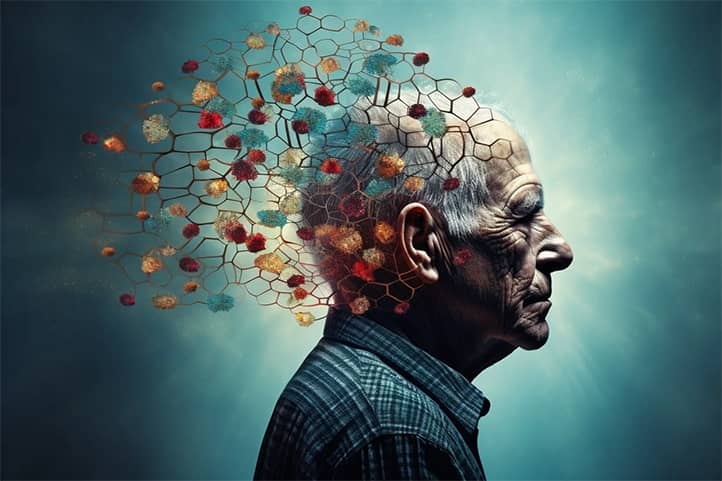Dementia is a general term used to describe a group of symptoms associated with persistent cognitive impairments, including memory, thinking, orientation, attention, speech, and decision-making abilities. Unlike the normal age-related decline in mental capabilities, dementia is a pathological condition that significantly impacts daily life. The most common form of dementia is Alzheimer’s disease, though other types exist, such as vascular dementia or Lewy body dementia.
Early detection of dementia is crucial for preserving a person’s quality of life. Timely diagnosis enables:
- Starting treatment or condition management, which helps slow disease progression.
- Involving the person in decision-making about future treatment, care, and life planning.
- Providing emotional support to both the patient and their loved ones.
- Preventing dangerous situations related to memory loss or disorientation, such as forgetting to turn off the gas or having trouble navigating surroundings.
Many people tend to ignore early signs or attribute them to normal aging, leading to missed opportunities for timely intervention.
Dementia is a global issue, becoming increasingly relevant each year due to population aging. According to the World Health Organization (WHO), more than 55 million people worldwide live with dementia, and approximately 10 million new cases are diagnosed annually.
In Ukraine, experts estimate that over 200,000 people have dementia, though the actual number may be significantly higher due to low diagnostic rates. The most vulnerable age group is those over 65 years old, but dementia can also develop at a younger age (presenile dementia).
By 2050, the number of people with this condition is expected to double due to the overall increase in life expectancy. This poses significant challenges for healthcare systems, as treating and caring for individuals with dementia requires substantial resources.

What is dementia?
Dementia is not a specific disease but a general term describing a set of symptoms associated with persistent cognitive impairments. It results from brain damage that affects memory, thinking, behavior, and the ability to perform daily tasks. Unlike normal age-related memory decline, dementia is a pathological condition that significantly limits a person’s independence.
Dementia is not a natural part of aging, although the risk increases with age. The condition can be progressive (e.g., Alzheimer’s disease) or caused by other factors, such as stroke or head injury. Globally, dementia is recognized as one of the leading causes of disability among older adults.
Key characteristics
Dementia is characterized by persistent cognitive impairments that affect:
- Memory: Especially short-term memory, resulting in forgetting recent events, dates, or appointments.
- Thinking and problem-solving: Difficulty analyzing situations, making decisions, and planning.
- Language: Challenges in finding words, understanding conversations, or constructing sentences.
- Orientation: A person may become lost even in familiar surroundings.
- Emotional state: Mood instability, irritability, apathy, or depression.
In later stages, dementia can lead to complete dependency on external help, loss of communication abilities, and an inability to perform basic tasks like eating or dressing.
Types of dementia
There are several primary types of dementia, each with unique features.
- Alzheimer’s disease
- The most common type of dementia, accounting for 60–70% of cases.
- Caused by the buildup of specific proteins in the brain (amyloid plaques and neurofibrillary tangles), which disrupt connections between neurons.
- Key symptoms: Progressive memory loss, speech difficulties, disorientation.
- Vascular dementia
- Results from disrupted blood flow to the brain, often following a stroke.
- Characteristics: Sudden onset and gradual worsening of cognitive functions.
- Symptoms: Problems with attention, slowed thinking, difficulties organizing tasks.
- Dementia with Lewy bodies
- Caused by the accumulation of abnormal proteins (Lewy bodies) in brain cells.
- Symptoms: Hallucinations, movement disorders, mood instability.
- Frontotemporal dementia
- Primarily affects the frontal and temporal lobes of the brain.
- Characteristics: Behavioral changes, apathy, loss of language functions.
- Mixed dementia
- A combination of several types of dementia, such as Alzheimer’s disease and vascular dementia.
Age risk groups
While dementia is more common in older adults, it is not exclusively an “old age disease.”
- People over 65 years old
- After this age, the risk of developing dementia doubles every five years. By age 85, the condition affects one in six individuals.
- People aged 40–65 years
- Early-onset dementia (presenile dementia) is less common but more aggressive in progression. Causes may include heredity or neurodegenerative processes.
- Risk factors in younger ages
- Head injuries, hypertension, obesity, diabetes, and low levels of physical and mental activity increase the likelihood of developing dementia later in life.
Understanding the nature and types of dementia, as well as identifying risk groups, helps prepare for its prevention or timely diagnosis. This is a crucial step in preserving quality of life and longevity.

Psychological Signs That May Indicate the Onset of Dementia
Dementia at early stages often manifests through psychological changes that may initially seem minor or easily attributed to age-related traits or stress. It is important to recognize these symptoms in time, as early diagnosis significantly enhances treatment effectiveness and allows the person to adapt to changes.
The signs of dementia typically develop gradually and can manifest in cognitive, emotional, and behavioral domains. They often affect not only the individual but also their close circle, as the changes become noticeable in everyday situations.
Memory Changes: Difficulty Retaining New Information
One of the most common early symptoms of dementia is short-term memory impairment. A person may struggle with:
- Remembering names, dates, or recent events.
- Recalling where they placed items such as keys or glasses.
- Retaining information necessary for completing daily tasks (e.g., a recipe for cooking).
At the same time, long-term memory generally remains intact in the early stages, making changes less noticeable to others. For instance, a person may vividly recall events from their youth but forget what happened yesterday.
Impairments in Concentration and Attention
A person with early signs of dementia may have difficulty focusing on a single task. This is evident in:
- Inability to complete tasks requiring sustained attention, such as reading a book or performing financial calculations.
- Distraction by minor stimuli, leaving tasks unfinished.
- Problems remembering the sequence of actions, such as while cooking or performing household chores.
Such difficulties in concentration affect the ability to adapt to new conditions or effectively complete even familiar tasks.
Emotional Instability
Early signs of dementia often include emotional changes, which may resemble depression or reactions to stress:
- Apathy: Loss of initiative, reluctance to socialize, or participate in family activities. A person may spend more time alone or ignore previously enjoyed activities.
- Anxiety: A sense of unease, especially in unfamiliar situations or when attempting complex tasks.
- Irritability: Heightened emotional reactivity, such as sudden outbursts of anger or sadness without apparent reason.
These emotional changes not only complicate communication but also impact the individual’s self-esteem, as they begin to sense their own difficulties.
Loss of Interest in Usual Activities or Hobbies
One of the earliest signals of dementia is indifference to previously enjoyable activities:
- A person may lose interest in hobbies such as gardening, crafting, or reading.
- Avoid social events like gatherings with friends or family celebrations.
- Neglect responsibilities or tasks they previously approached with enthusiasm, such as housework or participation in volunteer projects.
Such behavior is often perceived by loved ones as “fatigue” or “age-related energy decline,” but it may actually signal cognitive deterioration.
Each of these signs may seem insignificant individually, but their presence or combination is a strong reason to consult a specialist. Early diagnosis not only helps slow disease progression but also ensures proper care and psychological support for the affected individual.

How to Distinguish Dementia Symptoms from Normal Age-Related Changes
Aging naturally involves certain changes in cognitive and emotional domains, but their intensity and nature differ significantly from the manifestations of dementia. It’s important to understand that not every memory problem or decrease in energy is a sign of a disease. Differentiating normal age-related changes from dementia helps ensure timely consultation with a specialist if serious symptoms are present.
Normal age-related changes are typically gradual and mild. They do not critically affect daily life and allow the individual to adapt. In contrast, dementia-related changes are progressive, deepen over time, and significantly disrupt cognitive, emotional, and social functioning.
Comparison of Normal Aging and Dementia
Aging is a natural process that involves some changes in cognitive abilities, emotional states, and physical capacities. For example, a person may occasionally forget where they left their keys or need more time to think through complex tasks. Such changes are part of normal aging and do not critically affect quality of life. However, in cases of dementia, these changes become progressive and pathological, severely complicating daily activities.
Distinguishing between the two phenomena can be challenging, as early signs of dementia may resemble normal age-related changes. It’s important to pay attention to the intensity, frequency, and impact of symptoms on daily life. Understanding the difference allows for early detection of serious problems and timely medical consultation for diagnosis or reassurance.
Memory
- Normal aging: The individual may occasionally forget details but typically remembers them later. For example, temporarily forgetting a familiar name but recalling it after some time.
- Dementia: Forgetfulness becomes persistent and progressive. The person may not only forget the name of a close person but also fail to recognize them, even after being reminded.
Concentration and Attention
- Normal aging: Difficulty concentrating may occur due to fatigue or distractions, but overall ability to stay focused remains intact.
- Dementia: The individual cannot focus on tasks even under favorable conditions. They quickly lose track of conversations or get confused with simple sequences of actions.
Performing Daily Tasks
- Normal aging: Tasks may take more time, especially complex ones, but the person remains independent.
- Dementia: The individual forgets how to perform even routine activities, such as making tea or using a phone.
Orientation in Space
- Normal aging: Temporary difficulties with orientation in unfamiliar places.
- Dementia: Disorientation occurs even in familiar settings. For example, the person may get lost in their own home or forget the way to a nearby store.
Examples of Behavioral Differences
The manifestations of normal aging and dementia may look similar, but their impact on behavior is fundamentally different. While natural cognitive difficulties are minor inconveniences, progressive dementia symptoms severely disrupt the individual’s life.
Forgetting Events
- Normal aging: The person may forget they have already told a particular story but easily accepts a reminder.
- Dementia: The person may repeat the same story several times in a row, unaware of doing so, or forget they just had a conversation.
Mood Changes
- Normal aging: Mood may fluctuate but is usually linked to external circumstances.
- Dementia: Abrupt and unpredictable mood swings without any apparent reason, such as sudden anger or tears in a calm situation.
Communication
- Normal aging: The person may forget a word or phrase but finds a synonym or explains their thought in another way.
- Dementia: They experience difficulty finding words, making their speech unclear or hard to understand.
Hobbies
- Normal aging: There may be less time or desire to pursue hobbies due to physical fatigue.
- Dementia: The person may lose interest in hobbies entirely or forget how to engage in them, even if it was a favorite activity in the past.
Understanding the differences between normal age-related changes and early signs of dementia is key to early diagnosis. If cognitive or emotional changes begin to significantly impact quality of life, it is essential to consult a doctor for evaluation. This not only helps confirm or rule out the presence of the disease but also allows the person to maintain as much autonomy as possible.

The Role of Close Ones in Detecting Early Symptoms
Dementia develops gradually, and in its early stages, symptoms may be so subtle that the person affected either doesn’t notice them or doesn’t give them much thought. In such cases, it is often close ones—relatives, friends, or neighbors—who first notice changes in behavior, mood, or cognitive abilities. Their attentiveness and sensitivity are crucial for early diagnosis, as timely intervention can help slow the progression of the disease and maintain the person’s quality of life.
The role of close ones extends far beyond mere observation. They provide support during challenging moments, initiate conversations with the person showing concerning signs, and, if necessary, assist in arranging a visit to the doctor.
How Can Relatives Help Identify Changes?
Close ones are often in the best position to notice what the individual themselves might miss or ignore. For instance, if someone starts mixing up words in everyday conversation, forgets important events, or appears disoriented, this could signal the need for action. It is particularly important to pay attention to recurring situations that disrupt the usual flow of life.
Observation by close ones not only helps detect symptoms but also assesses their impact on quality of life. It’s essential to note aspects such as difficulties in organizing daily tasks, changes in behavior in familiar situations, or emotional reactions that are uncharacteristic for the person. Additionally, dementia often manifests alongside physical symptoms, such as fatigue or reduced mobility, so observation should be comprehensive.
Why Is Dialogue with the Person Showing Concerning Signs Important?
Detecting the early signs of dementia involves not just observation but also a sensitive discussion of the issues with the individual. A direct yet gentle dialogue can help determine how aware the person is of their challenges. For example, if someone frequently forgets whether they’ve taken their medication, it’s essential to ask if this is a new occurrence or if similar situations have happened before.
Dialogue also provides an opportunity to uncover hidden symptoms that the person may keep to themselves due to fear or embarrassment. For example, they might avoid discussing instances of getting lost on familiar routes or experiencing frequent confusion. Close ones should create an atmosphere of trust that allows the individual to talk openly about their difficulties without fear of judgment. This not only facilitates identifying problems but also aids in finding ways to provide support.
The importance of dialogue also lies in reducing the psychological pressure on the person. Clear, empathetic explanations of the situation and reassurances of willingness to help can prevent the isolation that often accompanies the early stages of dementia. Relatives should emphasize that consulting a doctor is not about receiving a “diagnosis” but about understanding the condition and finding ways to help.

What to Do When Suspicious Symptoms Are Detected?
The initial symptoms of dementia can cause concern for both the individual and their loved ones. These symptoms often seem minor or are attributed to stress, fatigue, or aging. However, ignoring such signals can lead to the progression of the condition, which, if left unaddressed, can seriously affect the quality of life. Timely action not only helps confirm or rule out suspicions but also allows for effective management of the condition in its early stages.
Early detection of dementia is critical for treatment. In many cases, timely diagnosis enables the application of methods that slow disease progression, adapt daily life, and provide psychological support.
Visiting a Doctor
The first step after noticing suspicious symptoms is to consult a healthcare professional. Begin with a family doctor who can evaluate overall health and refer you to specialists if necessary. Typically, neurologists, psychiatrists, or geriatricians are involved in diagnosing dementia, as these doctors have the expertise needed to address cognitive disorders.
A visit to the doctor is essential not only for diagnosis but also for alleviating psychological stress. Knowing that a professional is monitoring the condition provides a sense of security for both the individual and their relatives. Doctors can also provide recommendations for next steps, such as lifestyle changes or further diagnostic tests.
Diagnostic Methods
To confirm the diagnosis, doctors use a variety of methods to accurately assess cognitive functions:
- Cognitive Tests. The most common is the MMSE (Mini-Mental State Examination), which evaluates memory, attention, speech, and other cognitive abilities. These tests help identify even minor deviations.
- Magnetic Resonance Imaging (MRI). This method provides detailed images of the brain and can detect changes characteristic of dementia. For example, atrophy in specific brain areas is often a sign of Alzheimer’s disease.
- Consultations with Psychologists or Neurologists. Psychological assessments may include a deeper analysis of emotional state and behavioral traits, while neurological examinations help evaluate the physiological aspects of the impairments.
These diagnostic methods are comprehensive, ensuring maximum accuracy in identifying the causes of symptoms.
The Importance of Early Diagnosis for Effective Treatment
Early diagnosis plays a crucial role in managing dementia. While it is not yet possible to completely cure this condition, modern therapeutic methods can significantly slow its progression. For instance, starting medication early can help maintain cognitive functions over an extended period.
Additionally, early diagnosis allows individuals to adapt to changes, reassess their lifestyle, and develop strategies to compensate for cognitive difficulties. It also provides emotional preparation and enables family members to organize care and support. Understanding that the disease is in its early stages creates an opportunity to preserve quality of life as much as possible.
Early diagnosis is not just medical intervention; it marks the beginning of a process of acceptance and adaptation, which helps better manage the challenges that dementia brings.

Prevention and Support for Mental Health
Dementia poses a significant challenge, but numerous studies show that an active lifestyle, proper nutrition, and psychological support can substantially reduce the risk of its development. Preventive measures are especially important as they help delay the onset of the disease, preserving cognitive abilities and emotional stability.
Supporting mental health is vital both for those at risk and for individuals already diagnosed with dementia. Special attention should also be given to families providing care for such patients.
The Importance of an Active Lifestyle, Balanced Nutrition, and Cognitive Exercises
An active lifestyle is a crucial component in preventing dementia. Regular physical activity, such as walking, swimming, or yoga, improves blood circulation, promoting brain health. Research suggests that even 30 minutes of exercise several times a week can positively impact cognitive functions and overall well-being.
Balanced nutrition, rich in omega-3 fatty acids, antioxidants, and B vitamins, is another key factor. The Mediterranean diet, which emphasizes vegetables, fruits, fish, nuts, and olive oil, is recognized as one of the most effective for maintaining brain health.
Cognitive exercises, such as solving crosswords, learning foreign languages, or engaging in logic puzzles, stimulate neural activity, reducing the risk of dementia. Continuous mental activity keeps the brain “fit” and fosters the formation of new neural connections.
How to Reduce the Risk of Dementia
Reducing the risk of dementia is closely linked to overall health and avoiding risk factors. A key aspect is monitoring blood pressure, cholesterol, and blood sugar levels. Vascular conditions, such as hypertension or diabetes, are known to significantly increase the likelihood of cognitive disorders.
Avoiding harmful habits like smoking and excessive alcohol consumption is also crucial. These habits negatively affect blood flow and brain structure, contributing to cognitive decline.
Social engagement and communication also play an essential role. Frequent interactions with friends, participation in volunteer projects, or involvement in community activities not only foster psychological well-being but also stimulate the brain through social interaction.
Psychological Support for Patients and Their Families
A diagnosis of dementia is a significant stressor for both the patient and their loved ones. Psychological support is an integral part of successfully addressing this challenge. Patients need to know they are understood and supported, as this reduces anxiety and helps them better adapt to their new circumstances.
Families often require assistance in managing their emotions, as caregiving can be exhausting. Psychologists recommend learning communication skills tailored for people with cognitive impairments and finding ways to maintain their own mental health. Support groups for relatives or individual consultations with specialists can be valuable resources.
Creating a comfortable environment for the patient is also critical. Structuring daily routines, ensuring access to familiar items, and maintaining meaningful rituals can reduce stress levels and provide a sense of stability.

Conclusion
Dementia presents a serious challenge for both individuals and their close circle. Understanding the importance of early detection of psychological signs of this condition can significantly improve the patient’s quality of life. Changes in memory, attention, or emotional state, often perceived as minor, can be early signals that should not be ignored. Timely diagnosis allows for halting or slowing disease progression, opening the door to effective treatment and adaptation to new circumstances.
One of the key factors in successfully addressing dementia is seeking professional help promptly. Consultations with doctors, modern diagnostic methods, and support from specialists not only confirm the diagnosis but also help create an individualized treatment plan tailored to the patient’s needs. Ignoring symptoms or hoping they will resolve on their own can lead to irreversible consequences. Therefore, it is crucial to act at the first signs of suspicion.
The role of loved ones is particularly significant in this process. Their support, attention, and understanding are key to ensuring the patient does not feel isolated or abandoned. Relatives and friends can become a resource that helps the individual adapt to changes, provides emotional support, and organizes necessary care. Additionally, involvement in the patient’s life enables family members to better understand their needs, fostering harmonious interaction and reducing stress for everyone involved.
Dementia is not only a medical challenge but also a social one. Therefore, the combined efforts of doctors, family members, and the individual themselves can greatly improve outcomes in the fight against this condition. Awareness of symptoms, timely assistance, and support from loved ones create an environment in which even in a difficult situation, balance can be found, and humanity and quality of life can be preserved.




